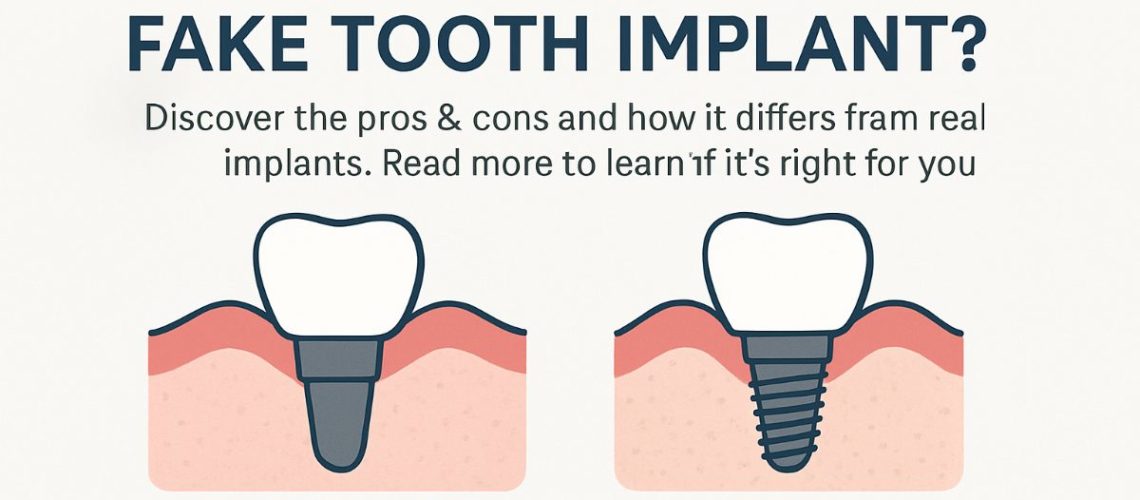Many people type fake tooth implant when searching for fast, low-cost ways to replace a missing tooth. That phrase can mean different things to different people. This post will explain what people usually mean by a fake tooth implant, compare short-term or cheaper options to true dental implants, and help you decide which choice fits your needs and health. You’ll get practical next steps to protect your smile whether you need a temporary fix or a permanent solution.
What Is A Fake Tooth Implant?
A fake tooth implant is an informal term for several non-permanent or lower-cost tooth replacements. It can refer to a temporary flipper (acrylic removable tooth), a removable partial denture, an adhesive or bonded bridge, or low-cost mini implants sometimes sold as quick fixes. Marketing may call these “same-day implants,” “holiday implants,” or “DIY implant kits,” which adds to the confusion. People search this phrase when they want a fast, affordable way to fill a gap without the time or cost of a full implant.
How A Fake Tooth Implant Differs From A Real Dental Implant
Procedure And Materials
Fake options usually sit on the gums, clip to nearby teeth, or bond to adjacent teeth with resin. They are made from acrylic, plastic, or lower-strength metals. A real dental implant is a titanium or zirconia post surgically placed into the jawbone. Over months the bone fuses to the post (osseointegration), creating a stable root replacement that supports a crown, bridge, or denture.
Stability And Function
Because fake options rest on soft tissue or on other teeth, they are less stable. Bite strength, chewing ability, and speech are usually limited compared with a true implant. Real implants act like natural roots, giving stronger bite force, better comfort, and bone stimulation that helps preserve jawbone volume over time.
Pros Of Choosing A Fake Tooth Implant
There are reasons people pick a fake tooth implant or similar temporary solution:
- Lower upfront cost than a surgical implant.
- Fast—often made the same day or within a few visits.
- Non-surgical or minimally invasive in many cases.
- Reversible—useful as a short-term cosmetic fix after an extraction or while planning a long-term option.
Cons And Long-Term Risks Of A Fake Tooth Implant
Short-term convenience can lead to long-term problems:
- Poor fit over time and frequent need for repairs or replacements.
- Accelerated bone loss because there is no root or post to stimulate the jawbone.
- Higher risk of food traps, gum inflammation, and dental decay on nearby teeth.
- Possible damage to neighboring teeth from clasps or bonding materials.
Who Might Be A Candidate For A Fake Tooth Implant?
A temporary or removable option may fit if you need a quick cosmetic fix, cannot have surgery for medical reasons, or are under severe budget limits. Common medical reasons to avoid surgery include uncontrolled diabetes, active oral infection, poor oral hygiene, or heavy smoking. Even then, discuss risks with a clinician before choosing a temporary prosthesis.
Risks, Complications, And When To See A Specialist
Complications from temporary tooth replacements can include infection, sore or irritated gums, shifting bite, and progressive bone loss. See a specialist if you have increasing pain, persistent swelling, a loose prosthetic that won’t stay in place, or signs of infection. A specialist will often recommend diagnostic imaging such as a CBCT scan to evaluate bone, nerves, and sinus anatomy before planning treatment.
Cost, Lifespan, And Maintenance
Costs vary a lot. Removable flippers and adhesive bridges are usually the cheapest up front. Mini implants and low-cost fixes may cost more but still less than conventional implants. Lifespan ranges from a few months to a few years for removable solutions—real implants can last decades with proper care. Temporary devices need daily cleaning, occasional relines, and periodic repairs; true implants require daily hygiene but far fewer repairs once healed.
Alternatives To A Fake Tooth Implant
Consider these options rather than a purely temporary fix:
- Removable partial denture (a stronger, adjustable removable option)
- Bonded (Maryland) bridge for limited spaces
- Conventional single dental implant for a permanent result
- Implant-supported denture for full-arch replacement
- Advanced solutions like zygomatic implants or single-day full-arch restorations for severe bone loss
Questions To Ask At Your Consultation
- Is the clinician board-certified or board-eligible?
- Do I need CBCT imaging to evaluate bone and nerve anatomy?
- What materials and implant brands do you use?
- What are the risks and the expected lifespan of this option?
- What sedation options and follow-up care are offered?
Why Consult A Board-Certified Oral Surgeon Before Choosing A Fake Tooth Implant
A board-certified oral surgeon evaluates your overall health, bone volume, and nerve position to recommend the safest, most predictable plan. Specialists use digital planning, 3D imaging, and guided surgery to reduce complications and improve outcomes. If a permanent implant is appropriate, a specialist can often offer same-day or single-day implant restorations using advanced tools and in-house lab workflows for accurate, fast results. Practices like Texas Center for Oral Surgery & Dental Implants focus on these technologies and have experience with complex options (including zygomatic implants and digital-guided full-arch care) when patients need a long-term solution.
Short FAQ
Is a fake tooth implant painful? Usually less invasive than surgery, but temporary devices can irritate gums and cause soreness.
How long will it last? Often months to a few years, depending on type and care. True implants are designed to last decades.
Will it cause bone loss? Yes—long-term lack of root or implant stimulation can speed jawbone resorption.
When should I choose a true implant instead? Choose a true implant when you want a long-term, stable solution and are a candidate for surgery after medical evaluation.

